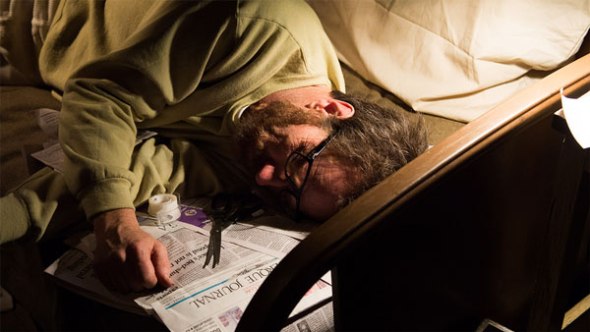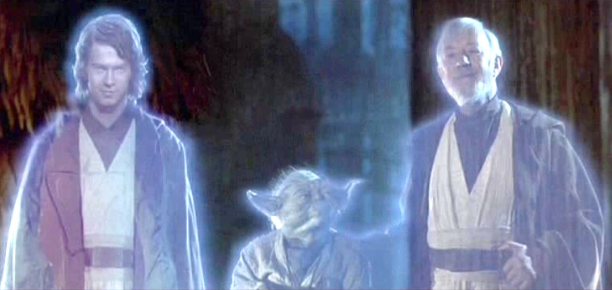[Ed. So with Breaking Bad ending this Sunday, and with last week’s excellent episode bouncing around in my head, I wanted to write something somewhat comprehensive about the show. I took the major spoilers and put them in the footnotes, but the central theme and image still is a spoiler and there’s no way around it. I tried to talk about it generally, but that only helps so much. I wrote this with two groups of people in mind: (1) People who love the show like me and can’t stop reading stuff about it as they get jazzed for the finale on Sunday night, and oh yeah are entirely caught up; (2) people who don’t know anything about the show, probably won’t watch it, but want to know why people keep tweeting/writing Facebook posts about it. If you really think you’re going to watch the show, you should just not read anything and watch it already! Anyway: on with the show.]

The TV show Breaking Bad is such a great thing. It’s one of my favorite things. It just won an Emmy for Best Drama and some are arguing that might be the best television show ever, so I know it’s not just me.
A quick, (mostly) spoiler-free summary of the show [Ed. if you’re a fan, you’re welcome to skip the next two paragraphs because you already know it all]:
Walter White is an overqualified high school chemistry teacher with a pregnant 40-year-old wife and a teenage son with cerebral palsy. He’s on the wrong side of the American dream: a genius who makes a living getting bratty kids to learn the periodic table and working at a car wash after school hours to make ends meet. As if this isn’t enough, halfway through the first episode Walt learns he has terminal lung cancer. Deciding he wants to leave a nest egg for his family, Walt teams up with a former student who knows the Albuquerque, New Mexico drug trade and, using his chemistry acumen, starts producing top-shelf methamphetamine.
Predictably, this gets his competitors uppity about this new player stepping into their territory, and Walt is forced to use science, shady lawyers, and straight-up violence to defeat his enemies, protect his very unaware family (at first, he doesn’t even tell them he has cancer), and keep the authorities (including his DEA agent brother-in-law) from tracking him down. He adopts a trade name for the drug world — Heisenberg, which just invites thematic reflection, right? — in an attempt to compartmentalize his new criminal life from his family life (his “real” self with “pure” motives). Of course, of all the lies Walt tells, the worst is the one he tells himself: that he can actually keep his two selves separate.
The best thing I can say about Breaking Bad is that it makes me think differently about my life. During this last season, I’ve kept myself awake in bed wondering why I still kinda root for Walt, who commits increasingly-indefensible acts of violence against those around him — sometimes actual physical violence against his enemies, and other times more subtle, emotional abuse by deceiving and manipulating his family and friends. But every time you’re ready to give up on Walt and call him capital-E Evil, the show writers remind you of the reason you empathized with him in the first place — his genuine love for his family.
The internet yells at people like me who still pull for Walt. Critics scold us for ignoring all the bad stuff Walt’s done, and I have to say I’ve been forced to wrestle with the dark places in my heart that really do long to break bad (we all have them [1]).
But I’ve realized that I don’t root for Walt to get away with it — and plot-wise that’s pretty much impossible, since every bad decision or evil action by any character has been followed by an attendant consequence [2] (like bullets shot into the air, they have to land somewhere [3]). This unflinching moral character is what makes the show connect to Christian audiences, I think.
No, I don’t hope Walt escapes. That goes against the grain of the entire show, and wouldn’t make it any different from what our generally nihilistic, amoral popular culture tells us about reality. I’ve realized that I long for Walt’s redemption — a sudden, decisive change in thinking, a complete about-face represented by a single, comprehensive, selfless act like turning himself in and (for once) not shifting responsibility or self-justifying. In other words, something a lot like the first stages of Christian conversion — when one looks unflinchingly at their debilitating sinfulness (Rom. 1-3:20) before turning to the cross (Rom. 3:21-26).
Is that even possible in the Breaking Bad world? I don’t think so. There’s no religion in the White household or anywhere else, but more fundamentally there’s nothing resembling transformative grace. The closest we get, I think, is surprisingly in the character of Jesse Pinkman, Walt’s former F student-turned-junkie-turned methamphetamine business partner, and the second-most nuanced character in the series. Unlike Walt, whose moral sensibility has dissolved over time, Jesse’s slowly emerged from behind his rough, wannabe-drug lord facade. You can see it in his tenderness around children, his desire to be a responsible provider for his girlfriend and her son, but especially his sensitivity to his own sinfulness, perhaps most acute in a memorable scene from season 4.
At the end of season 3, Jesse did something to protect him and Walt [4], but Jesse knows that regardless of his intentions, what he did was truly evil. In the video below, Jesse wants to confess to his rehab group, but veils his real sin by telling the group he’s killed dogs — still bad, but not something too serious to reach the police. While Walt justifies and excuses his actions [5], and despite the counselor repeatedly feeding him “accept who you are” garbage, Jesse owns his sin (there’s mild language): [Ed. WordPress doesn’t let us embed videos now? Okay then, watch it here. Here’s a transcript.]
Counselor: So the truth is, we can’t change the past, what’s done is done. We gotta own our actions, but putting ourselves on trial, acting as our own judge, jury, and executioner — it’s not the answer. Because a lot of the time, all that judging does is just ensure that we’re gonna repeat the cycle. Right? We’re not here to sit in judgment.
Jesse: Why not? I mean, if you just do stuff and nothing happens, what’s it all mean? What’s the point? Alright, this whole thing is about self-acceptance?
Counselor: Kicking the h*ll out of yourself doesn’t give meaning to anything.
J: So I should stop judging and accept?
C: It’s a start!
J: So no matter what I do, hurray for me because I’m a great guy? It’s all good? No matter how many dogs I kill, I just do an inventory and accept? I mean, you back your truck over your own kid, and you like, accept? What a load of crap.
C: Hey, Jesse, I know you’re in pain —
J: Hey, you know what? You know why I’m here in the first place? It’s to sell you meth! You’re nothing to me but customers! You okay with that? Huh? You “accept”?
C: No.
J: [Pause] About time.
Jesus might have said to Jesse here that he was not far from the kingdom. He knows he’s done horrible things, he knows he can never make it right, and he knows that no one can ever fix his shattered conscience. But there’s no grace. No gospel. Without hope, Jesse tragically spirals downward.
In “Granite State,” five seasons of Walt’s psychological abuse and manipulation of Jesse has finally taken hold, reaching rock bottom in a horrifying way I won’t ruin for those of you who haven’t seen it yet. It’s heartbreaking.
[Ed. Okay, here’s where I get spoiler-y.]
Meanwhile, Walt is holed up in a New Hampshire cabin with nothing but his thoughts and his $11 million in a 55-gallon barrel. Walt has been rushing to cook, cover his tracks, and kill his way past cancer for over a year now, ostensibly doing anything necessary to provide for his family before he dies, never allowing himself a moment to consider the ramifications of his actions. And now there’s nothing to do but consider. Walt has no choice but to think about what he’s done, while Jesse’s been thinking about his actions for three seasons; both are now trapped in a hell of their own making.
Apart from all the usual things we praise about Breaking Bad (the acting, cinematography, thrilling hands-at-your-mouth moments, the morality play with distinct biblical resonances like the unavoidable consequences of sin, Walt’s inflated ego and Shakespearean folly along with our strange and consistent empathy with him), an underrated thing it does well is create powerful images that stick with us. The pink teddy bear, the toy eyeball, the porkpie hat, the box cutter, the fly, the painting, the pizza on the roof — there are numerous examples. They’re interesting, unique, compelling, and carry a depth of symbolic meaning for nerds like me to plumb. As far as narrative images go, they’re ideal — they accomplish all these things without being forced (things like that painting and mirrors get really subtextual).
Last week’s penultimate episode of the series, “Granite State,” [6] has one of my favorite images in Breaking Bad. For reasons I won’t go into, Walt ends up alone in snowy New Hampshire cabin [7], cancer finally ravaging his body and no news from Albuquerque except scattered newspaper clippings. He’s pathetic.
In C.S. Lewis’ fantasy novel The Great Divorce, souls condemned to Hell/Purgatory are permitted a bus trip for an excursion into Heaven. One of the themes is the “smallness” of Hell and its inhabitants — no one can lift even a single blade of grass because it’s too heavy, and the point of view of each of the visitors is so myopic that they can’t stop making excuses long enough to see the beauty of Heaven around them. Their self-absorption overwhelms them. Consider Tim Keller’s reflection on this in The Reason for God:
“The people in Hell are miserable, but Lewis shows us why. We see raging like unchecked flames their pride, their paranoia, their self-pity, their certainly that everyone else is wrong … All their humility is gone, and thus so is their sanity. They are utterly, finally locked in a prison of their own self-centeredness, and their pride progressively expands into a bigger and bigger mushroom cloud. They continue to go to pieces forever, blaming everyone but themselves. Hell is that, writ large.”
The idea of a vacation alone in the woods of New Hampshire, with a warm cabin and two acres of land all to myself, sounds rather wonderful. A character tells Walt that “it’s kind of beautiful,” but Walt dismisses this. This “excursion” is hell for him. [8] He’s slowly shriveling, and we’re struck by how suddenly helpless and small he seems. Heisenberg has faded, all that’s left is his cancer-ridden body and the soul he sold to the meth trade. Sure, he tells someone that “he’s made mistakes” but then he says that things happened he “never intended,” and talks about how it was always for good reasons. He can’t stop lying — even to himself.
Vince Gilligan, Breaking Bad’s creator and show runner, has not resisted some of the religious themes behind his show (though he’s far from religious himself):
“If there’s a larger lesson to Breaking Bad, it’s that actions have consequences,” Gilligan said during lunch one day in his trailer. “If religion is a reaction of man, and nothing more, it seems to me that it represents a human desire for wrongdoers to be punished. I hate the idea of Idi Amin living in Saudi Arabia for the last 25 years of his life. That galls me to no end.”
He paused for a moment and speared a few tater tots in a white plastic-foam tray perched on his lap.
“I feel some sort of need for biblical atonement, or justice, or something,” he said between chews. “I like to believe there is some comeuppance, that karma kicks in at some point, even if it takes years or decades to happen,” he went on. “My girlfriend says this great thing that’s become my philosophy as well. ‘I want to believe there’s a heaven. But I can’t not believe there’s a hell.’ ”
If Breaking Bad is all about justice, Walt disintegrating alone in some wilderness cabin — his meth formula copied, his family ruined, and his money worthless — is it.

———
[1] As a side note it’s rather amazing that a secular show could make a robust and compelling illustration for original/indwelling sin.
[2] (I’m putting big spoilers in the footnotes, intending them as deeper discussion for people caught up with the show). Walt’s sins are obvious, but cf. Jesse’s drug use (frankly, he’s as responsible as Walt for Jane’s death), Skyler’s adultery (encumbering her with responsibility for Ted, costing her family hundreds of thousands of dollars, leading to Walt’s meltdown in 411 “Crawl Space” and almost killing her whole family), Marie’s shoplifting (she gets caught) and her decision to accept dubious “gambling winnings” to pay for Hank’s therapy (implicating Hank in Walt’s illicit drug money three seasons later), Hank’s Ahab-like obsession with catching his white whale (White, Walter) and his willingness to sacrifice the life of Jesse to do it (leading to, of course, his death). Even a generally positive character like Mike Ehrmantraut dies in essentially the same way he killed others for Gus, and was about to kill Walt at the end of season 3. It goes on an on. Be sure your sin will find you out.
[3] Or even better, like Saul’s statement in his introductory episode “Better Caul Saul” in season 2 — “the way I see it, someone’s going to prison.”
[4] Again, spoiler (do I have to keep saying this?): killing Gale.
[5] Consider his stammering, tearful plea to his son over the phone at the end of “Granite State”: “I did wrong, I made some … terrible mistakes, but the reasons were always [good]. Things happened I never intended, I never … intended,” as if killing, lying, manipulating and abusing people he claimed to love are made okay because he didn’t mean it. As if what actually happened is somehow less significant than what he wanted to happen.
[6] You might consider all the various nuances to a deceptively simple episode title like “Granite State”: It obviously references the state of New Hampshire itself, but also the characters’ state — frozen in time, unable to transcend their circumstances, stuck. I wrote something on Facebook about the poem “Ozymandias” (the name of that horrifying episode before this one), and how the ancient Egyptian statue that probably inspired the classic Shelley poem (which was the centerpiece for a popular promo before this season) was made out of granite. What shattered violently in “Ozymandias” now sinks to the bottom in “Granite State.” There’s also undoubtedly a play on words with “hitting rock bottom.”
[7] As promised in the teaser in 501 (the Denny’s diner flash forward) and 509 (returning to the house).
[8] The spoiler details: Hank is dead, his family thinks Walt killed him (which he kind of did), his wife and son hate him, and he’s alone with the guilt for everything he’s done over the last year and a half.













